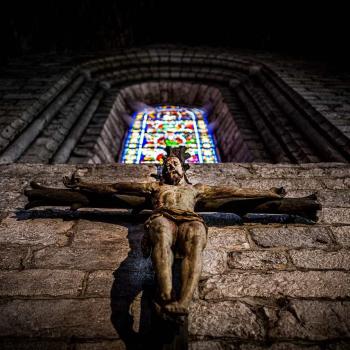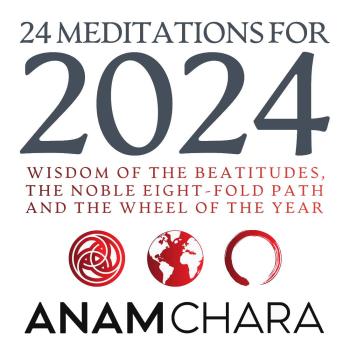
The other day I received this message from a reader who contacted me via Facebook…
I was intrigued by your recent post about the dangers of relying on experience. I fully agree with you, not least because I believe I have had experiences of God but I managed to turn them into idols every time, chasing after them and trying to conjure them up at my bidding.
I am now at a point where my contemplation focuses on the sacred in the ordinary, the depths of everyday life. My question for you: I am looking for ways to share the contemplative dimension with others, particularly in my little church community. Do you believe the “sacred in the ordinary” is something that anyone can “experience”, something that can be shared with others and fostered in a community?
Thanks for your message. Experience itself is not the enemy, it’s what we do with experience that gets us into trouble. As you yourself point out, we can turn our experience of God into an idol, or we can use “experience” as a kind of shibboleth to distinguish between what we think is (and isn’t) spiritual truth, and we can try to limit God to our category of human experience (which is the corollary to making experience an idol: I worship God, but only insofar as I experience this God). What it all boils down to is that a spiritually that is centered on experience is a spiritually at risk of collapsing into narcissism (as soon as the experience becomes more about me than about God).
I think the antidote to the idolatry of experience is learning to hold our experiences lightly. As they say in the east, if you meet the Buddha on the road, kill him. Our corollary might be, when you have an experience of God, crucify it. Let it die — knowing, in faith, that every death is an opening-up to the possibility of resurrection.
So even the experience of the Sacred in the Ordinary is still an experience, even if it is gentler and subtler than a four-alarm “mystical experience” akin to the Transfiguration or the conversion of St. Paul. So I still think the key is to hold our experiences (or, conversely, our “lack” of experience) gently and lightly. If you meet the Buddha on the road, just smile and keep on walking.
Now, to your question. I think the best approach to sharing contemplative practice with others is to offer a mix of spiritual exercise and relevant stories or readings out of the Bible. For so many people, contemplative prayer is such a gift — a place of gentleness and quiet where they can relax and simply offer their hearts to God — that you don’t need to “sell” it. For those who aren’t sure, typically a few Bible passages are very reassuring:
Be still and know that I am God. (Psalm 46:10)
For God alone my soul waits in silence. (Psalm 62:1)
The Lord is in his holy temple, let all the earth keep silence before him! (Habakkuk 2:20) combine this with:
God’s temple is holy, and you are that temple. (I Corinthians 3:17)Whenever you pray, go into your room and shut the door and pray to your Father who is in secret… (Matthew 6:6) — the tradition interpreted “going into your room” as going within the heart, i.e. contemplation, the prayer of the heart.
I think when introducing people to contemplative practice, it’s sensible to point out that one of the typical by-products of sustained contemplative prayer is a tendency to more readily discern the presence of God in the ordinary moments of the day. But I wouldn’t make too big of a deal about it. Once again, hold it gently and lightly. Everyone’s experience is different and unique. For some people, entering into silent prayer can paradoxically lead to a profound sense of God’s absence. That does not mean they are failing at contemplation or doing it “wrong.” On the contrary, it’s possible that this is precisely the path that these folks need to walk on — the path of darkness and unknowing — in order to grow in their relationship with God.
Certainly if you have a small prayer group that meets regularly, try to share some of the stories of the mystics — their lives are chock full of stories of encounter with God, in both very ordinary and very extraordinary ways — with the group, but always with the understanding that everyone’s journey into the heart of God is unique. Some of us are visionaries, some are poets, some are artists, some are servants, some are lovers, some are philosophers, and so forth… and God relates to us in a manner consistent with the unique gifts we have been given. So it’s really important to learn not to judge one’s own experience (or lack thereof) in prayer with the stories of the mystics or even the other members of our prayer group!
Finally, you asked “Do you believe the ‘sacred in the ordinary’ is something that anyone can ‘experience,’ something that can be shared with others and fostered in a community?” My answer to this question is yes, yes, and yes — but I would point out that if we hold experience gently and lightly, then it’s okay for people to have whatever experience they do (or don’t) have; and while it is usually very helpful and insightful to share our spiritual experiences with others (in a safe, confidential and non-judgmental setting, of course), I think such sharing should always be optional; as for fostering the experience of God-in-the-ordinary, I would suggest it’s better to focus on fostering the prayer practice rather than certain experiences — if we pray, and we persevere in praying, the experiences that we need will most assuredly come to us. We just need to trust this.
I hope this is helpful. Thanks for your question, and please let me know how it goes!
Enjoy reading this blog?
Click here to become a patron.
Stay in touch! Connect with Carl McColman on Facebook:














